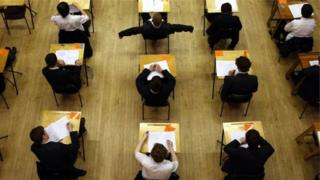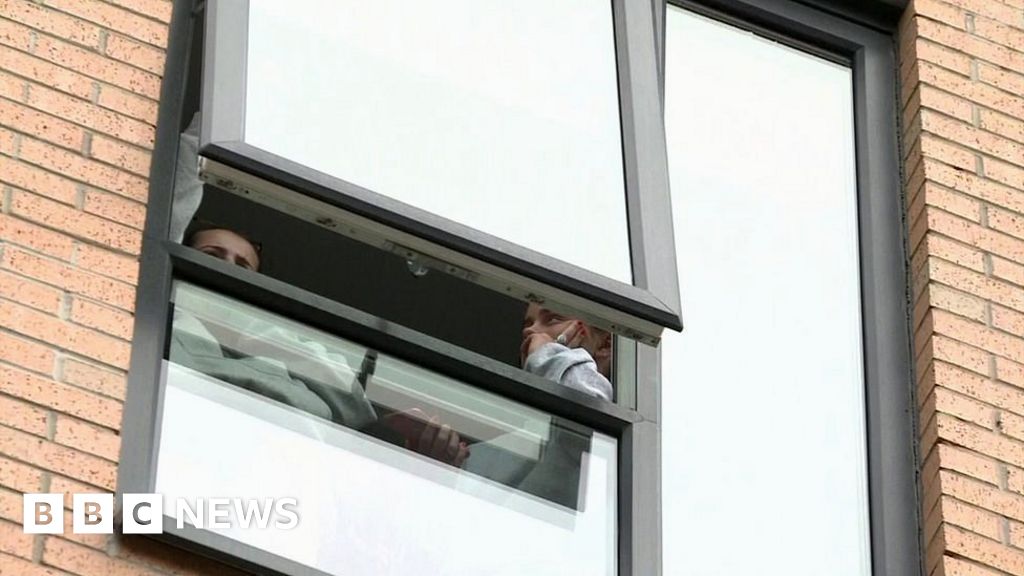 Image copyright
PA Media
Image copyright
PA Media
Over a third of estimated grades allocated by teachers to NI's A-level and AS level students were lowered in the final results.
About 28,000 pupils across Northern Ireland received their results on Thursday morning.
Overall, 37% of estimated grades were lowered and 5.3% were raised.
Unlike other years, this year's results have been estimated after exams were cancelled by the Covid-19 pandemic.
The proportion of A* to A grades awarded to A level pupils has risen by 2.3%.
In Northern Ireland, A-level grades were based on previous AS results, resit data and teachers' predicted grades for their students.
A similar system was used in England, where 36% of entries had a lower grade than teachers predicted.
In Northern Ireland, 58% of this year's A-level and AS results matched the grade estimated by the pupil's teacher.
Last year, 45.8% of estimated grades provided by schools matched the student's final results.
The proportion of A* grades has risen by 1%.
A* to A grades rose by 2.3%. The overall percentage pass rate rose by 0.8%.
Image caption CCEA Chief Executive Justin Edwards says the new A-Level was developed with the help of the IT industryJustin Edwards, chief executive of the Council for the Curriculum, Examinations and Assessment (CCEA), said NI students "have seen slight increases across grades, which are comparable with previous year on year performance for this particular year group".
"Since the cancellation of the exams, it has been a very unsettling and challenging period for the education community, particularly our students," he added.
"Northern Ireland's students, and those across the UK, Ireland and further afield, due to Covid-19 were unable to sit their exams, as has been common place for so many before, and will be for so many in the future.
"All of us at CCEA, working closely with the education community, have strived to ensure that students are able to progress this year."
CCEA's 'anomalies' warning
Maths, biology, business studies, religious studies and chemistry were the top five most popular subjects in 2020.
Almost 40% of A level entries in Northern Ireland were in STEM subjects.
There was a 2.3 % rise in the number of females studying science, technology, engineering and maths in comparison to last year.
Earlier, CCEA had admitted there would be "anomalies" in some of the grades awarded.
In an email to principals on Wednesday, CCEA said it recognised there would be concern about some results.
It said it would "start contacting schools where we have seen anomalies in terms of judgements provided and the grade issued".
As exams were cancelled, grades are awarded based on predicted grades from schools, which have been standardised by CCEA.
A similar system is also in place in England and Wales, and about 12% of pupils in Northern Ireland take subjects through exam boards from those countries.
In Scotland, results predicted by teachers alone will now be used to give pupils their grades.
That is after a major U-turn by the Scottish government on Tuesday, which abandoned a moderation system for grades by the Scottish Qualifications Authority (SQA).
Results 'very erratic'
St. Cecilia's College principal Martine Mulhern said her experience on results day had been of "sheer disappointment".
"I haven't slept all night, because I am just worried about going in and facing the day," she told BBC NI's Good Morning Ulster.
"I have just found the results to be very erratic, a lack of consistency.
"I am waking up this morning to hear that Wales have said that they are guaranteeing A-level or A2 students their AS grades as a minimum grade, whereas 13% of our grades at A2 level were actually lower than their AS grades, which we would have always considered to be the baseline from moving on to A2.
"I understand these are very difficult circumstances and CCEA have worked very hard to come up with a model, but in all of that what has been lost are the children."
In response, Education Minister Peter Weir said the results in terms of the overall picture were embargoed until later on Thursday morning and people would see a "different picture".
He added that "any case in which somebody has been unfairly treated because the grade they have received does not reflect their prior performance, then there is the opportunity directly for an appeal".
"And indeed anybody in that circumstance will be treated sympathetically."
While pupils getting grades from CCEA can get them online, many of those getting results from English and Welsh boards will have to go to their school to pick them up.
Pupils in Northern Ireland have outperformed their counterparts in England and Wales in recent years.
Just over 30% of entries were awarded A* or A grades in 2019.
CCEA will operate a dedicated exams helpline for pupils on 028 9026 1260 from 13-26 August.

 5 years ago
1125
5 years ago
1125 
